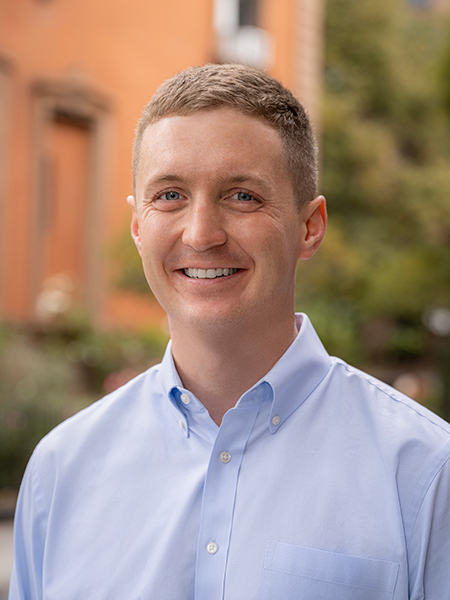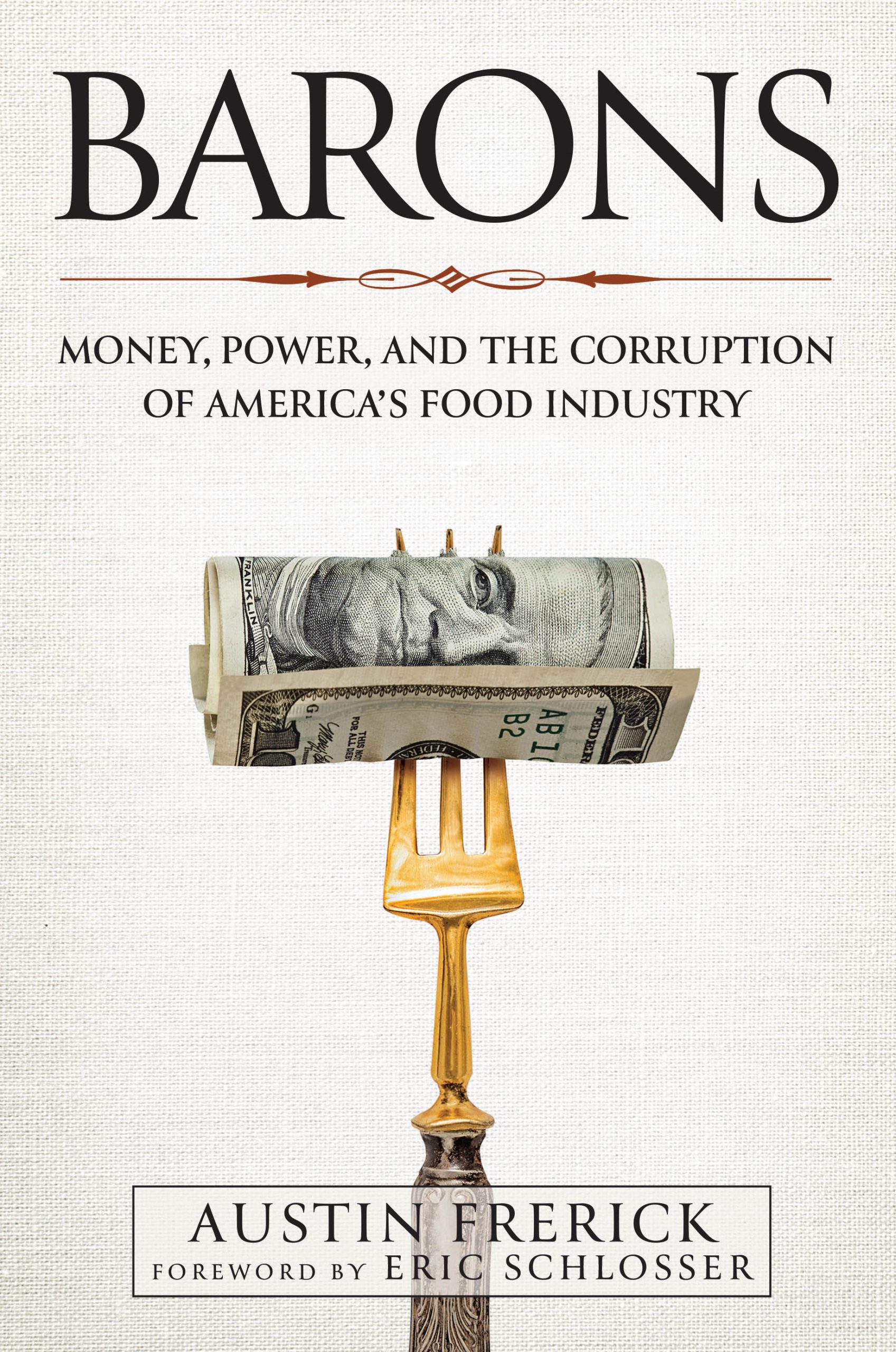Wealthy “robber barons” of the late 19th century like Andrew Carnegie, Cornelius Vanderbilt, and John D. Rockefeller were known for ruthless, unethical business practices. A new book describes how modern-day robber barons dominate America’s food industry.
In Barons: Money, Power, and the Corruption of America’s Food Industry, agricultural and antitrust expert Austin Frerick tells the stories of seven corporate titans, their rise to power, and the consequences for everyone else. There is Mike McCloskey, Chairman of Fair Oaks Farms, a dairy company that operates mechanized warehouses filled with tens of thousands of cows that never see the light of day. There is a secretive German family that took over the global coffee industry in less than a decade, relying on wealth traced back to the Nazis. These and other stories in Barons are examples of the monopolies and ubiquitous corruption that define American food.
The food barons are the result of the deregulation of the American food industry, a phenomenon that has led to the consolidation of wealth into the hands of few to the detriment of our neighborhoods, livelihoods, and democracy itself.
With Barons, Frerick paints a stark portrait of the consequences of corporate consolidation, but also shows that we can choose a different path. The book describes how a fair, healthy, and prosperous food industry is possible if we take back power from the barons who have robbed us of it.
Austin Frerick is an expert on agricultural and antitrust policy. He worked at the Open Markets Institute, the U.S. Department of the Treasury, and the Congressional Research Service before becoming a Fellow at Yale University. He is a 7th generation Iowan and 1st generation college graduate, with degrees from Grinnell College and the University of Wisconsin, Madison.
Ken Roseboro, editor of The Organic & Non-GMO Report, recently interviewed Frerick about his book.
Tell me about the book and what led you to write it.

Austin Frerick
Austin Frerick: It starts back in 2018 with Iowa’s governor race between Kim Reynolds and Fred Hubbell. Jeff Hansen, who is now Iowa’s largest hog producer and owner of Iowa Select Farms, gave Reynolds over $300,000 for her re-election campaign. What a powerful symbol about what’s happened to Iowa, that the most politically powerful person now is a hog baron.
That led me to co-author an article for Vox about Hansen. The goal of the article was to tell how he amassed so much power so fast and destroyed the family hog farm at the same time.
I realized after writing the article that what we see in the hog industry, we also see across the food system: massive consolidation by industry titans who cut corners and shaped the markets to their economic benefit.
How did you research these companies and the impact they’re having?
Austin Frerick: It was a combination of this things. I read every newspaper clip I could find on every baron and noted things that I saw as patterns and identified people I could talk to. I also talked to journalists who covered these industries.
I messaged current and former employees on LinkedIn to talk to them, and allowed them to talk off the record. A lot of it was just talking to them about their industry experience. I would say “I think this is going on” or “What do you think?” Most of these people because of their job security didn’t want to go on the record, which I totally understood, but it was just nice to talk to people who work in these spaces because every market is different. The California food system is very different from the Iowa food system; berries are very different from corn. I really had to learn the nuances of each industry.
You said you identified certain patterns with the barons. What were the patterns that you noticed?
Austin Frerick: It was more of confirming certain hypotheses that I had. For example, I discussed how Cargill uses a beachhead strategy. Before they enter an industry, they buy a little bit of a company or a small company to get a feel for the industry. Then they either double down or pull out. If they double down, they make massive, aggressive acquisitions in that space to have a dominant market position.
Any other patterns that you noticed with these companies?
Austin Frerick: What I noticed is that they usually become a robber baron because they’re willing to cross unethical lines that other people aren’t willing to cross. Most hog farmers weren’t willing to stuff thousands of other animals inside a metal shed all day or destroy their communities in this incredibly destructive production model.
The hog baron, Jeff Hansen, was willing to engage in this incredibly destructive production model at the expense of the community and animals.
There’s a story about Walmart, which is my grocery baron. One of Sam Walton’s strategies early on was to exploit a legal loophole where a business didn’t have to pay the minimum wage if it was a small entity. So he legally structured every Walmart as its own entity so he could pay the workers there one-half the minimum wage.
What are some other examples of these companies being unethical?
Austin Frerick: Driscoll’s, the California berry producer, is the one that shocks a lot of people. They have a massive market share and sell one in three berries in America. They also sell a lot of organic berries.
But they don’t grow a single berry. They use contract farming. They basically took the old sharecropping model from the south that exploited black farmers and applied it to modern day berry production. So a lot of berries now are grown offshore or in developing countries where officials look the other way.
What are some of the impacts of these barons on our food system?
Austin Frerick: First is cost. The industry will always say cheap food, and that’s just not true. Per person in America, we spend more on food than most other Western democracies. And we’re spending more for garbage.
There’s also been a collapse in quality and taste. Produce grown offshore is not engineered for taste; it’s engineered for durability. That’s why there’s such a huge difference between a strawberry in your backyard and one you buy in a store.
These are very concentrated markets. And we know from Economics 101 that cartels or monopolies gouge. That’s where profit is. And consumers are bearing the brunt of it.
Who are some of the other barons you profiled?
Austin Frerick: JAB, a secret German family, is my coffee baron. People haven’t heard of them, but I’m almost certainly they’ve had one of their products in the last month. They own Panera, Krispy Kreme, and Keurig cups.
They entered the American coffee markets in 2012, and they quickly dominated coffee. Now they sell more coffee than Starbucks. They bought all these different brands—Caribou Coffee, Einstein Brothers Bagels, Bruegger’s Bagels, and Noah’s New York Bagels.
What has been the response to the book?
Austin Frerick: In general, what gives me hope is that the book is hitting a lot of different segments of America because everyone thinks the food system is not working, but for different reasons.
This book has been well received in conservative media. I got a really good review from the American Conservative. The book is also well received in the business world.
Something I didn’t expect is how much people are reaching out and telling me that I should look at this other situation or know this thing. Because people see what’s going on, especially older people, who know what the system used to be.
What do you hope to achieve with the book?
Austin Frerick: I want to have an honest conversation over where the food system is, and I wanted to focus on where do we go from here? What does a post-gilded age food system look like? What do the reformers need to do? That to me this is the big picture of what my book is trying to do.
I think with a lot of coastal media there’s a romanticism or obsession with food for the one percent. I want to focus on how to improve food for the person who goes to Dollar General.
I also feel that neither political party has articulated a positive vision in this space.
What is your vision of a better food system?
Austin Frerick: I think corn ethanol is going to die soon. Cars are moving to hybrids and electric vehicles. I think about what we can do with all that land without the corn. My hope is that we put animals back on the land and serve good, healthy food, grown locally to our children.
Imagine culinary professionals working with local supply chains, local farmers, cooking healthy foods, and working with teachers, who are teaching kids about what they’re eating. We’d also restore middle class family farms that are better for the environment. This is not anything innovative. The question is how do we scale that? To me, it’s such a win-win. This is a positive vision, and that’s where you can really inspire people.





